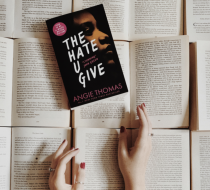The Hate You Give Favorite
‘The Hate U Give’: A modern wakeup call to subtle racism
By Nevin Thombre
Aug. 27, 2020, 6:49 p.m.
Angie Thomas’s “The Hate U Give,” a best-selling book and film adaption, weaves together action, comedy, friendship and romance while touching on prevalent forms of racism deeply rooted in the fabric of society. The novel follows 16-year-old Starr Carter, who has to cope with the shooting of her best friend Khalil Harris, and her journey to find a sense of identity within her neighborhood and predominantly white school.
After being the sole witness to Harris’s shooting, Carter is conflicted on whether to speak out — she can continue to let the media paint Khalil as the criminal Black man, or take a stand, but with the risk of being stereotyped an “angry Black woman.” She fears being misrepresented by the media or even her peers, as she was taught from a young age that she must take additional precautions to preserve her reputation. Readers discover the extent to which the media reinforces racial prejudices and stereotypes through its perception of Harris as a criminal — not a grandson trying to pay for his grandmother’s cancer treatment.
Looking at race relations from the eyes of a young, impressionable Black girl humanizes Carter’s struggle to voice her support for Khalil, especially at school, when she is ridiculed by one of her best friends for using social media to talk about police brutality. Her discomfort is apparent as she faces microaggressions from her peers — from fried-chicken references to being labeled as a non-threatening Black person. Thomas allows readers to understand implicit biases — how they are unintentionally perpetuated and the detrimental effects they have on Black youth.
Thomas also depicts the stigma Carter receives for being in an interracial relationship, which results in considerable backlash from her community. At school, she has to endure stares from her white peers over dating a white boy, while at home she faces criticism for not embracing her Black identity. Through uncomfortable but necessary conversations with her family and friends, Carter’s insecurity morphs into confidence and courage as the novel progresses — she embraces her relationship as part of her identity, rather than letting societal judgment define her.
The novel also examines performative activism, as well as efforts by those who co-opt racial justice movements. Thomas craftily steers away from the textbook definition of racism and tackles progressive movements’ mob mentalities. Many of Carter’s classmates are seen protesting Khalil’s death, but then cut class instead of advocating against police brutality. Carter’s sheer disbelief at this faux outrage demonstrates how many forms of modern-day activism are ill-intentioned and unproductive. Readers are able to empathize with Carter and understand the damage inflicted when people capitalize on an important movement for personal gain.
“The Hate U Give” is a microcosm of the unrest, turmoil and polarization in our country today, sprinkled with themes about family, identity, individuality and race. It perfectly mixes humor, pop culture references and romance while illustrating how racism continues to be embedded within society. Viewing the world through Carter’s perspective exemplifies the day-to-day hardships of millions of young adolescents who struggle to express themselves without being subject to typecasting or stereotyping. Thomas highlights that racism — whether implicit or explicit — cannot be eradicated instantaneously but requires productive discourse for any progress to be made.







